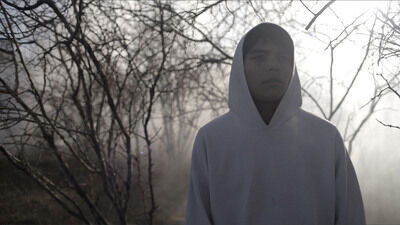
As lyrical as it is captious, Raha Amirfazli and Alireza Ghasemi’s “In the Land of Brothers” begins with a text explaining that the title refers to the nickname Afghani refugees—totaling nearly 5 million people—have given to their adoptive country. Set in 2001, 2011, and 2021, each chapter follows a different member of an extended Afghani refugee family: Mohammad, Leila, and Ghasem.
We first meet the family living together in Bojnord, where shy teenager Mohammad (a soulful Mohammad Hosseini) splits his time growing tomatoes with his family, studying ironworks at school, and learning English at night with his sweetheart Leila (Hamideh Jafari, radiant). A decade later, a world-weary Leila, now with a child from an arranged marriage, works for a wealthy family in Bandar Anzali. A decade after that, Ghasem (Nikzad Bashir, tremendous) and his deaf wife Hanieh (Marjan Khaleghi) are living with their spunky young daughter Maryam (Sara Jafari ) in the city of Karaj, when they learn the true cost of trying call Iran home.
The filmmakers quickly establish a rich world of contrasts. In the first chapter, the family’s greenhouse is filled with the verdant greens and reds of tomatoes, leaves, and vines, while outside a cold white snow seems to envelop the whole world. At home, Mohammad is surrounded by the warmth of his family. Outside, he is harassed by police because of his refugee status who coerced into unpaid labor, and worse. In the second chapter, Leia’s whole body is tense, Jafari’s face an atlas of human emotion as she walks a tightrope of panic, after making a fateful discovery about her husband. However, her son Omid (Amirmohammad Alidousti) only knows the playful freedom of childhood innocence. Her wealthy Iranian employers talk nonchalantly about their upcoming trip to Canada, while Leila must hide the truth from them or risk deportation. In the final chapter, everyone seems settled at last. Hanieh operates from an irrepressible place of hope for her son Hamed’s future abroad while their daughter Maryam finds joy in boxing. Even Ghasem seems at peace, until he learns of their son’s unfortunate fate, after which his body quakes with grief and his eyes hold the weight of the world.

As a ceremony welcomes certain Afghani refugees as full citizens at last, the auditorium is filled with nothing but grieving families. It’s here the filmmakers leave you, wondering whether Iran will ever truly embrace these people as brothers and, in the end, if it was even worth the price they paid.
With “Veni Vidi Vici,” filmmakers Daniel Hoesl and Julia Niemann’s take aim at the billionaire class and their neoliberal enablers. Told in three chapters, one for each piece of the famous phrase, their film is slickly made, with clear inspirations found in the films of Ruben Östlund, but never rises above its initial premise, which is essentially the Ayn Rand quote which opens the film: “The point is, who will stop me?”

